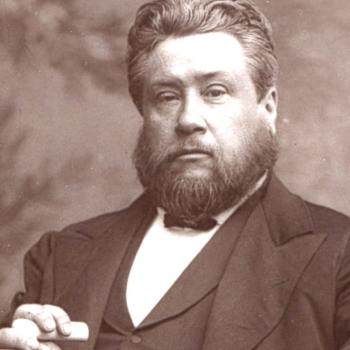Sealing with the Spirit, Part 2
‘In whom also after that ye believed, ye were sealed with that holy Spirit of promise.’ (Ephesians 1:13)
* * * *
Last week, in the first MLJ Monday, Lloyd-Jones, in his exposition of Ephesians 1:13, defined in careful detail what the term ‘seal’ embodies and how we can understand this term. In this week’s quotes, he goes on to show us how this sealing was promised throughout Scripture, and in what sense the Holy Spirit was not given until the day of Pentecost. He describes for us the nature of sealing by outlining, in negative terms, what it is NOT. Lloyd-Jones begins by saying that this statement in Ephesians 1:13
‘is one of the most vital statements for us as Christian people at the present time. If I were asked to give a diagnosis as to what is wrong with the Christian Church today, and as to what has been her chief trouble for a number of years, I would suggest that it is her failure to understand this statement . . . . It is because Christian people have not been manifesting the Christian life as it should be lived that the world has ceased to be interested in Christianity . . . . A lifeless and moribund church never achieves anything of lasting value, but when something happens in the Church the world hears about it; its curiosity is aroused, and as on the Day of Pentecost, it begins to ask what certain phenomena signify. Such is the history of every revival; it is God’s way of working. He quickens His Church and His people first.’
Lloyd-Jones emphasizes the importance of establishing the doctrine:
‘. . . for unless we are satisfied with regard to the doctrine, we are never likely to experience it. And it is because so many hold a wrong doctrine with regard to this question of the sealing of the Spirit that they lack the experience of it.’
The above point seems to be critical. So many seem to think that since God is sovereign He can and will pour out His Holy Spirit on anyone as He chooses. This is a bit like saying God is sovereign over who becomes a Christian so we don’t need to preach or encourage people to have faith. The truth is, we will rarely if ever get what we don’t believe in and ask for. God wants us to ASK, and if we don’t BELIEVE in an experience of his Spirit, then why would we ask? Lloyd-Jones then begins to show how the Bible develops this doctrine:
‘. . . the Apostle himself gave us a very fruitful suggestion when he says that the Ephesian believers were sealed with ‘that holy Spirit of promise’. He does not simply say, ‘You were sealed with the Holy Spirit’ but specifically refers to ‘that Holy Spirit of promise’ . . . . Clearly this focuses our attention upon ‘that promise’, the Holy Spirit of that promise; which means ‘You were sealed with that Spirit which had been promised’, the Spirit in connection with whom certain promises had been made.’
Lloyd-Jones shows how throughout all of Scripture we see this promise being reiterated:
- Isaiah’many references to the Holy Spirit being ‘poured forth’. (See chapters 40 to end.)
- Ezekiel’‘God will take the ‘stony’ heart out the ‘the house of Israel’ and give them ‘hearts of flesh’. He will pour out His Spirit upon them.’ (See chapters 36 and 37.)
- Joel”But perhaps the most striking example is that which is given in the second chapter of the prophet Joel. This is the passage which the Apostle Peter quoted and expounded on the day of Pentecost. . . .’
‘These are not drunken as ye suppose, seeing it is but the third hour of the day: but this is that which was spoken by the prophet Joel . . . . It shall come to pass in the last days, saith God, I will pour out of my Spirit upon all flesh, and your sons and your daughters shall prophesy, and your young men shall see visions and your old men shall dream dreams.’
”This is that’, says the Apostle; God has done that which He promised through the prophets in those ancient times. Such is the meaning of the expression ‘Spirit of promise’.’
The Doctor then gives us examples from the New Testament:
- ‘This is the very essence of John the Baptist’s preaching:
‘I indeed baptize you with water, but one mightier than I cometh, the latchet of whose shoes I am not worthy to unloose: he shall bapt
ize you with the Holy Ghost and with fire.’
The forerunner of the Messiah Himself calls attention to the difference between his ministry and our Lord’s in terms of the coming of the Spirit . . . .’
- ‘Our Lord taught the same message:
‘If ye, being evil, know how to give good gifts unto your children, how much more shall your heavenly Father give the Holy Spirit to them that ask him.’
‘. . . and note that this is in the context of importunity in prayer. There are those who teach that, on dispensational grounds, this no longer applies to us . . . But surely that is quite unacceptable. The teaching of our Lord is for all of us.’
‘There is a further significant statement in the seventh chapter of John’s Gospel, which deals directly with this matter, and especially John’s own comment upon it in verses 37 to 39.
‘In the last day, that great day of the feast, Jesus stood and cried saying, ‘If any man thirst let him come unto me and drink. He that believeth on me, as the Scripture hath said, out of his belly shall flow rivers of living water.’
‘Then comes John’s comment on it in brackets:
‘But this spake he of the Spirit, which they that believe on him should receive, for the Holy Ghost was not yet given, because that Jesus was not yet glorified.’
‘There, once more, we have the clear teaching with regard to this ‘holy Spirit of promise’. ‘They who believe on me”and no others’says Christ, are going to receive this. And John reminds us that this is a prophecy concerning something that would happen in the future.’
- ‘Then turning to the fourteenth chapter of John’s Gospel . . . Our Lord was about to meet His death . . . [the disciples] were downcast, and their hearts were troubled . . . But He says to them, ‘Let not your heart be troubled; ye believe in God, believe also in me (v. 1), and then He goes on to tell them ‘I will pray the Father, and he shall give you another Comforter’ (v. 16) . . . Chapters 14, 15, and 16 of John’s Gospel are full of promise.’
- ‘Then finally comes the crucial statement in the first chapter of the book of Acts . . . (vv. 4-8). The Lord commanded them not to depart from Jerusalem but to wait for the promise of the Father, ‘the Holy Spirit of promise’ . . . Then to cap it all, in the second chapter of Acts in verse 33 we find the important statement made by the Apostle Peter . . .
‘Therefore, being by the right hand of God exalted, and having received of the Father the promise of the Holy Ghost, he has shed forth this which ye now see and hear.’
‘Peter says that the Holy Spirit, so long promised, had been given at last to the Son in the light of His perfect work, and the Son had shed Him forth. The Holy Spirit that had been promised had actually been given.’
‘That the blessing of Abraham might come on the Gentiles through Jesus Christ, that we might receive the promise of the Spirit through faith.’ (Galatians 3:14.)
Lloyd-Jones now addresses the question of whether the Holy Spirit had been operative before Pentecost:
‘Clearly it does not mean that the Holy Spirit had not been given at all . . . until the day of Pentecost. That cannot be the case because we find that even the men of the Old Testament dispensation had the Spirit. The one thing that David most feared after he had committed the terrible sins of adultery and murder is seen in his prayer, ‘Take not thy Holy Spirit from me’ (Psalm 51:11.) . . . To lose the Spirit was the one thing he dreaded above everything else . . . The Holy Spirit was in all the saints of the Old Testament’in Abraham, Isaac, Jacob, and in all the elect of God . . . They were the children of faith; and as we are told by Paul, we as Christians are all the children of Abraham because we are the children of faith . . . Our position is that we are sharing with them, are made fellow-heirs with them of these blessings of God.’
‘The disciples of our Lord had already received the Spirit in that sense long before the day of Pentecost . . . They had not only believed already, they had been enabled to do certain great works, and yet He still promises them the Holy Ghost . . . .’
‘So the interpretation of the statement in John 7:39”The Holy Ghost was not yet given because that Jesus was not yet glorified’, is that the Holy Ghost was not yet given in this particular manner. He had been given already in the other ways, but not in this way. This is a peculiar blessing that had not yet arrived; they had had other blessings, they were believers, and it was as believers that they would receive this further blessing. So clearly, this ‘promise of the father’ is some special giving of the Holy Sprit which had been promised through the centuries . . .and Pentecost saw its fulfillment’.
The Doctor then defines what this ‘fulfilment’ actually represents. He does this by first providing negatives.
‘We are driven to do so by the misunderstanding concerning this matter. To make positive statements is not enough; one has to be negative first so as to correct what one regards as false teaching. Clearly then this sealing with the promised Spirit does not mean the work of the Holy Spirit in regeneration, or repentance, or faith. That the Apostles were not regenerated until the day of Pentecost is an impossible suggestion . . . .’
‘But it may be argued that that was before Pentecost and that ever since Pentecost these two things happen together. The answer to that contention is supplied by the case of the Samaritans in the eighth chapter of the Book of Acts . . . . They had believed on the Lord Jesus Christ’which cannot be done without the Holy Spirit’they had exercised faith, they were born again, they had repented and believed and had been baptized; but still they had not yet received the Spirit in the sense of ‘sealing’. And this applies not only to the Samaritans, but also to Paul himself, and also to the Ephesian disciples mentioned in the nineteenth chapter of Acts.’
‘Secondly, the fulfilment has no reference to the unction that is given to us by the Holy Spirit for our spiritual understanding . . . ‘Ye have an unction’ an anointing, says John in his First Epistle (2:20, 27). Clearly this sealing with the Spirit does not apply here, because you can have this unction and spiritual understanding and still not know this sealing . . . proved in the last chapter of Luke’s Gospel where we read that our . . . Lord . . . having risen from the dead . . . took His disciples through the Scriptures’the Psalms and the Prophets and Moses’and showed them the truth concerning Himself . . . they could not have received it without enlightenment by the Holy Spirit; but still they had not received the special blessing which came to them on the day of Pentecost.’
‘Thirdly, and particularly important, the sealing with the Spirit is not sanctification. To believe that it is has been the chief error in connection with the subject . . .The teaching of the Scripture is that the moment a man is ‘born again’ his sanctification has and must have started. The process of making him holy and separating him unto God has already begun. There is no greater error than to teach that you can receive your justification by faith and then later on receive your sanctification by faith. Sanctification is not an experience, not a gift to be received: it is a work of the Holy Spirit in the heart which starts from the moment of regeneration. This sealing with the Spirit therefore cannot be sanctification; indeed, it has nothing to do with it in a direct sense . . . It is quite distinct and separate.’
‘What helps to make this yet clearer is the fact that the Apostle in describing this sealing refers to it as something which has happened in the past”In whom, after that ye believed, ye were sealed’. But sanctification is not something that happens once and for all; it is a process that goes on and on increasingly and develops more and more. The Galatians were in a very poor state as regards sanctification, yet Paul says that they had received the Spirit in this sense of ‘sealing.’ The same applies to the Church in Corinth even more strikingly . . . .Sealing is an experience, something that God does to us, and we know when it happens. You cannot say that about . . . sanctification . . . It is a work which goes on steadily and progressively . . . .’
‘I would go further still and say that sealing with the Spirit is not even a manifestation of the fruit of the Spirit . . . I hold that you can manifest such fruit without of necessity knowing ‘the sealing of the Spirit’, for the bringing forth of that fruit is a part of the work of the Spirit within us which goes on steadily . . . .’
Lloyd-Jones also gives two additional negatives’that the sealing with the Spirit does not mean the ordinary ‘assurance’ of salvation, and that sealing ‘is not the fulness of the Spirit.’ In the case of assurance, he states:
‘. . . the sealing of the Spirit does not mean ‘assurance’ of salvation as a result of our believing the Word or as a result of arguments worked out from the Word. The common teaching regarding assurance is to take [people] to the Scriptures . . . . to give [them] strong grounds for assurance.’
MLJ shows that on the basis of God’s Word we can come to assurance of salvation, and that this is particularly effective as found in the First Epistle of John, which provides the ‘strong grounds for assurance’ to which he refers above. But he continues:
And yet I am suggesting that the sealing of the Spirit is more than we have so far considered. It is a yet stronger and higher form of assurance. It includes the blessings mentioned [in the Scriptures], but goes beyond them . . . .the sealing with the Spirit is something additional to that, and is something done by the Spirit to us.’
In the case of the fulness of the Spirit, MLJ quotes Ephesians where Paul
‘. . . gives a commandment, an exhortation, in which he says, ‘Be filled with the Spirit’, which means ‘Go on being filled with the Spirit’ (5:18). That is something . . . you and I can control . . . . it is something that is to be a perpetual state and condition, we are to ‘go on being filled’ . . . But here [in Ephesians 1:13] in describing this ‘sealing,’ the Apostle refers to something that has happened in the past. ‘You were sealed’, he says, you know that it has happened; and, furthermore, it was something that was done to you, not something that you do . . . .’
Lloyd-Jones now points us forward to what we can expect from him next week:
‘Having thus established the doctrine we are in a position to go on to deal with the thing itself, to consider what the Scripture tells us about this wonderful this glorious ‘sealing’ that made such a difference to the Apostles and others . . . It is God’s action, in which He bears witness that we are His children, that He is our Father, and that we are ‘heirs of God and joint-heirs with Christ’ . . . It is God’s authentication of the fact that we really belong to Him.‘
Excerpts in this post are quoted from: D. Martyn Lloyd-Jones, An Exposition of Ephesians 1, “God’s Ultimate Purpose,” chapter 22, pp. 255-265. Throughout the post, emphasis has been added to MLJs quotes.
More on being a Reformed Charismatic
- MLJ Monday ‘ Sealed with the Spirit #1
- 2000 posts and a big thank you to The Doctor
- Martyn Lloyd-Jones on the vital place of joy in the Holy Spirit
- More from Lloyd-Jones on the baptism of the Spirit
- Lloyd-Jones on Baptism with the Holy Spirit
- Apostles are meant for today
- Has the Holy Spirit rushed on you?
- What is a reformed Charismatic?
- Its all about you Jesus……calvinism and worship












